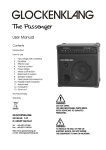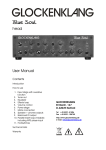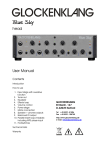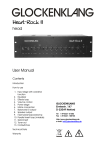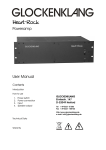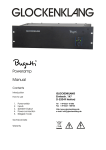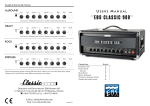Download Heart-Rock head
Transcript
Heart-Rock head User Manual Contents Introduction How to use 1. Input stage with overdrive function 2. Equalizer 3. Effects loop 4. Volume control 5. Power stage 6. Mains connection 7. Balanced DI output 8. Speaker output 9. Insert preamp/poweramp 10. Parallel insert loop (mixable) 11. Serial insert 12. Tuner out 13. Footswitches Technical Data Warranty GLOCKENKLANG Eimterstr. 147 D-32049 Herford Tel +49-5221-51506 Fax +49-5221-108755 http://www.glockenklang.de e-mail: [email protected] Thank you for choosing the GLOCKENKLANG Heart-Rock amplifier. You have purchased an exquisite piece of equipment, which was designed after the most modern technical aspects. Attention! To activate your additional 3 years warranty, you should send in the enclosed warranty card. Please enter the serial number of your amplifier and the date of purchase and send it to : Glockenklang Eimterstrasse 147 D-32049 Herford Germany or email to: [email protected] This serves as a measure to ensure excellent customer service in the future. For your safety Please read the following instructions carefully. These tips will ensure long and trouble free operation of your new GLOCKENKLANG product. Operational restrictions Do not operate the amplifier under the following conditions: • • • • In direct sunlight In extremely dirty or dusty places In extremely humid or wet places Around heat emitting appliances Caution: When rack mounting the amplifier, make sure to leave adequate room for ventilation. The unit needs this ventilation space to adequately exhaust it´s internally generated heat. Handling Do not drop the amp. Do not use excessive force when activating switches and dials. WARNING! DO NOT OPEN! NO USER SERVICEABLE PARTS INSIDE. REFER SERVICING TO QUALIFIED PERSONNEL. Care Use a soft, clean and dry cloth only to clean the amplifier. Do not use aggressive chemicals to clean the housing. Do not use compressed air to clean the housing. You may carefully vacuum the air intake and exhaust areas from time to time to remove loose dust accumulation. Please, keep this User Manual for future references General instructions Your Heart-Rock head´s special features: • 3 effect loops "insert" is a serial loop "effect" is a parallel loop with blending control from 0% till 100% on the front panel, "pre amp out" "power amp in" is a second serial loop. The insert is switched pre-eq, the effects loop is switched post eq/pre volume control/pre-DI out. Pre-amp out - Power amp in are post master volume/post eq/post DI. This send/return is very useful for use of equalizers and stage sound processors that are not desired to go to the DI output. • Power amp protection circuit The power amp is short circuit , high temperature, and DC voltage protected. In case of high temperature or DC current, the yellow "Protect" LED will come on. Caution: Please ensure adequate ventilation when rack mounting the amplifier. Leave a minimum of 5 mm space below and above the amplifier. Make sure that the air entry/discharge vents at the left side of the housing are unobstructed. WARNING! TO REDUCE THE RISC OF FIRE OR ELECTRIC SHOCK, SHOCK, DO NOT EXPOSE THIS EQUIPMENT TO RAIN OR MOISTURE. 1.1 Input A Jack 2.1 Equalizer with On Switch Normal instrument input Bass, Low, Mid, High and Treble controls serve to fine tune your sound or solve acoustical problems on stage. They will be activated by the On Switch. The frequencies are centered at 60 Hz, 130 Hz, 550 Hz, 4,2 KHz and 12 KHz. 1.2 Tune Switch (Mute Function) Mutes all outputs but the Tuner Out. Can be activated by footswitch. 1.3 Input B Jack Instrument input for high level instruments. Adjustable via Input B Trim knob. As a general rule, the trim pot should not be used to attenuate the input signal so much that the gain control has to be set higher than 5 (twelve o'clock). 1.4 A/B Switch Activates Input A or Input B, enabling switching of two instruments. 1.5 Trim Input B Control Pre gain trim for Input B, you can adjust the level between 0 dB and -20 dB. Attention: As a rule, keep gain control about halfway up and adjust trim control accordingly. 1.6 Gain Control w/ Peak LED Matches input signal to preamp. To adjust, turn knob until the Peak LED above the control only flickers at highest and loudest peaks. The level in the Effect Loop is then adjusted to +4 dB and the headroom to overdrive is 20 dB. For overdrive function, give more gain. The Peak LED then lights and flickers more, but that is ok. 3.1 Effect On Switch Activates the Effect Loop ( Parallel Loop ). This feature can also be activated by foot switch. 3.2 Effect Control Mixes the effects loop into the original signal from 0% ( original signal only) to 100% (effect only) 4.1 Volume Control Serves as main volume control for the poweramp and the Preamp Out jack on the rear. Due to the logarithmic curve of the pot, you have to turn it up about 3 to 4 o´clock for full output-power! 5.1 Power Switch A/C Switch to turn on power to the unit. Power On is indicated by a green LED. 5.2 Protect LED (red) Illuminates when one of the protection circuits activates. The speakers will be disconnected with this light on. 5.3 Peak LED (yellow) Illuminates when the power stage of the amplifier begins to clip (overdrive). It warns of overdrive and distortion. 6.1 A/C Mains cable and fuse 9.3 Preamp Out Jack Mains cable with A/C connector. The fuse is located in the small compartment above. The fuse is rated at 6,3A/slo for 230V operation and 12A/slo for 120V operation. This jack carries the pre-amplified signal post volume control. This can serve as a connection for a second power amp or as a send for effects that are only used for stage sound and not sent to the DI. 7.1 DI Out XLR Connector This is the output of the integrated DI Box. It is for balanced connectivity to mixing consoles. The signal is routed to this output pre-volume control for independent stage volume adjustment possibilities. Caution! This output is electronically balanced. Do not ground pin 3, when using unbalanced cables in this jack. Pin 3 is unused for unbalanced operation! 7.2 DI Level Control Matches DI output with mixing console input 7.3 DI pre/post Switch Chooses among the following DI modes: pre: before eq and serial insert post: post eq and serial/parallel insert offers a choice between pure or processed bass guitar signal 8.1 Speaker Out Connector 4-pole speakon jacks for speaker connections. These jacks are in parallel. Connect one 2,7 ohms or one 4 ohms and one 8 ohms or three 8 ohms cabinets here. The maximum power rating is 1000 watts into 2,7 ohms, the minimum permissible speaker impedance is 2,7 ohms. Connection is pins +1 and +2 hot, pins –1 and –2 cold. 9.1 Poweramp In Jack This leads directly to the poweramp section of the amp, for using external preamps. The internal preamp signal is disconnected when using this input. Also serves as return for the second serial insert. Will be activated by the On switch above. 10.1 Loop Return Jack Connect to the output of an effects processor, that is supposed to be looped into the effects loop. Can be used as a mix input (i.e. an additional preamp, the mix ratio can be adjusted at the Effect control on the front. 10.2 Loop Send Jack To be connected to an effects units input. The level is +4dB 11.1 Insert Return Jack Connect to the output of an effects unit for use in a serial configuration. The signal path will be interrupted when plugged in and the Insert On switch (above the Send jack) is activated. 11.2 Insert Send Jack The input of an effects unit for serial configuration (i.e. equalizer or compressor). The signal level is +4dB. The signal is taken post gain, but pre eq. 11.3 Insert On Switch Activates the Insert 12.1 Tuner Out Jack Serves as a connection for a tuner. This output is always active. 13.1 Footswitch Tune Jack Serves as a connection for the mute function footswitch. It has the same function as the mute button on the amp front. 13.2 Footswitch Loop Jack 9.2 Ground Lift Switch Separates Signal Ground from Chassis Ground to eliminate hum and buzz, when connecting other A/C connected gear. Serves as a connection for the loop function footswitch. It has the same function as the loop button on the amp front.




